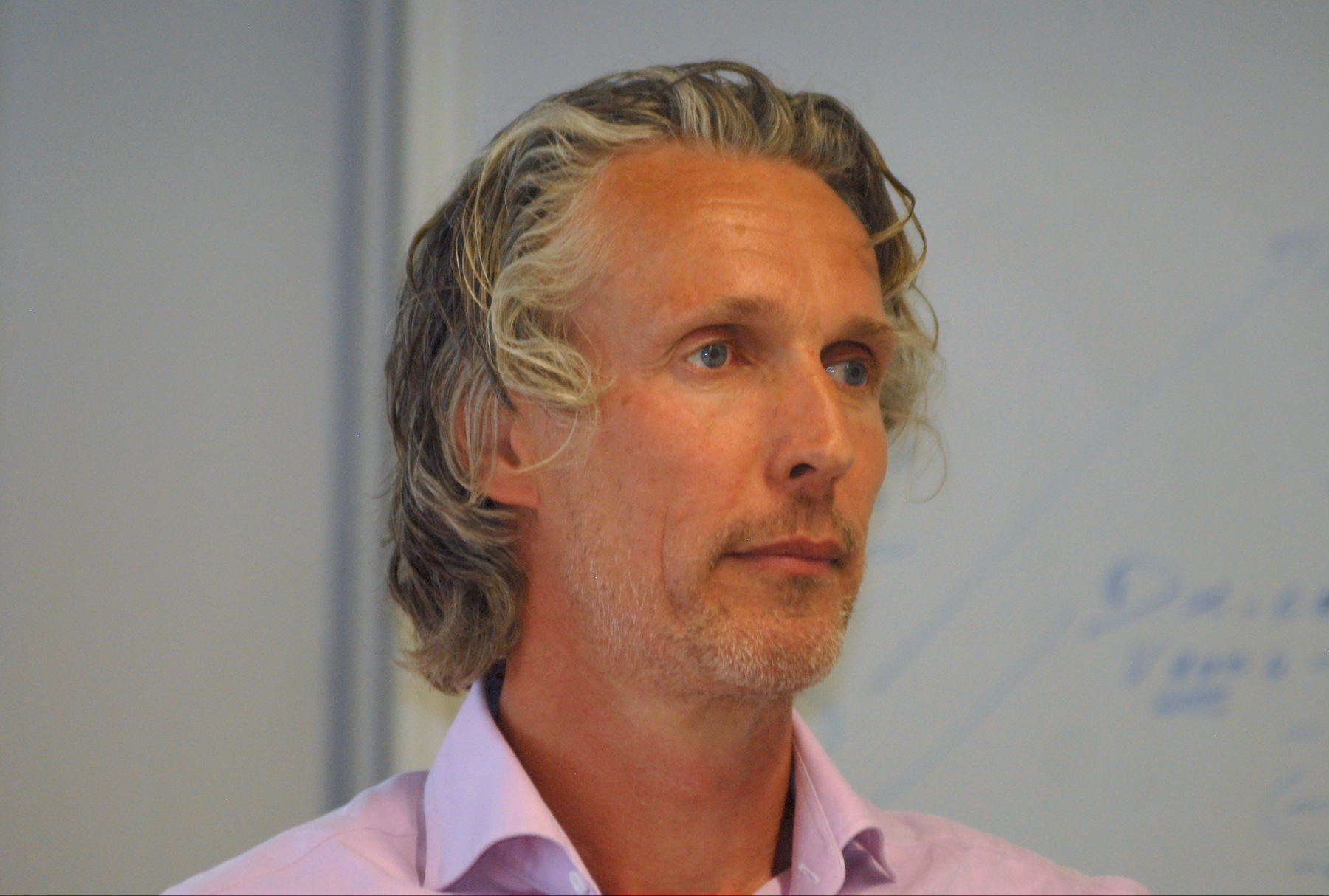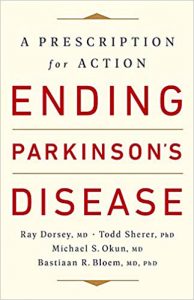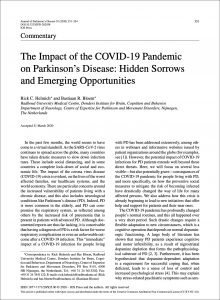Dutch Neurologist Warns of ‘Parkinson’s Pandemic’ Linked to Toxic Chemicals
Written by |

Dutch neurologist Bastiaan Bloem, MD, is one of the world's top experts on Parkinson's disease. (Photo by Larry Luxner)
As the world frantically battles coronavirus, a leading Dutch neurologist warns of the next global pandemic — and this one, he says, is almost entirely of our own making.
Bastiaan Bloem, MD, a neurologist and professor at Radboud University Nijmegen Medical Center, says that over the next 20 years, the number of people with Parkinson’s disease (PD) will likely double — from the present 6.5 million to more than 13 million.
 The main cause of this exponential jump: widespread exposure to herbicides, solvents, and other toxic chemicals used in agriculture and manufacturing.
The main cause of this exponential jump: widespread exposure to herbicides, solvents, and other toxic chemicals used in agriculture and manufacturing.
“A pandemic, as everybody is now painfully aware, is a disease happening worldwide, to which no one is immune. PD fulfills all those criteria,” Bloem told Parkinson’s News Today in a phone interview from the Netherlands.
“Parkinson’s is now the fastest-growing neurological condition on the planet.”
Bloem is co-author of a new book, “Ending Parkinson’s Disease: A Prescription for Action,” along with Ray Dorsey, MD, a neurologist with the University of Rochester, New York; neuroscientist Todd Sherer, PhD, chief executive officer of The Michael J. Fox Foundation; and Michael S. Okun, MD, a neurologist with the University of Florida.
The 336-page book, published on March 17, has quickly become the bestselling neurology book on Amazon.
“Many neurological conditions such as Alzheimer’s disease are increasingly common because our population is getting older,” Bloem said. “But in a large survey published in The Lancet, after correcting for the aging effect, Alzheimer’s is stabilizing and stroke is actually diminishing thanks to better treatment.
“Literally, the only condition that’s accelerating over and above the aging effect is Parkinson’s disease.”
Bloem, 53, points to the tight link between exposure to herbicides such as paraquat — a weed killer — and the risk of developing Parkinson’s.
“These chemicals were introduced worldwide after World War II, and many are still used today on our fields,” he said. “For this reason, farmers are at a markedly increased risk of developing Parkinson’s. If you feed a mouse paraquat — which is banned in China but not the U.S. — it will kill the dopamine-producing cells in the brain. These chemicals are tremendously toxic to the brain and have even been detected in milk, in supermarkets.”
Paraquat isn’t the only such chemical posing this risk. Trichloroethylene, a solvent used to clean metals and remove stains, has exactly the same effect on human brains. Yet it’s still widely used and is detectable in high concentrations in groundwater, he said.
“Parkinson’s is exploding in numbers, it’s a horribly debilitating disease, and it’s a costly disease that should matter to people and governments. We’re doing this to ourselves,” Bloem said. “But we can do something about it. We need to get rid of these toxic pesticides and move toward organic food. And we should take measures to protect people who work in these toxic environments.”
In the book, he added, parallels are drawn “to HIV and polio, which were once incurable, debilitating diseases. In the 1980s, people with AIDS chained themselves to the front doors of pharmaceutical companies demanding better treatments, and now people no longer die of AIDS.
“We need to raise awareness about this pandemic that’s happening right now.”
ParkinsonNet draws praise
Bloem, who’s published more than 700 scientific papers and book chapters on the subject, is a towering figure in his field — and not only because he’s 6-foot-7.
“Innovative healthcare concepts are now seen as an export product of Holland, not just wooden shoes and tulips — and Parkinson’s is a recognizable disease affecting Muhammad Ali, Michael J. Fox, Alan Alda, Ozzy Osbourne, Linda Ronstadt and other famous people,” said Bloem, who played volleyball on the Dutch national team in his youth.
His 11-minute TEDx talk, “From God to Guide,” was widely praised by viewers on YouTube.
“I strongly believe the future of health care is specialized networks, where well-trained specialists treat high caseloads,” he said. “Leaving specialized care merely to the hands of generalists is a thing of the past.”
Bloem and his colleague, Marten Munneke, are the brains behind ParkinsonNet, an acclaimed Dutch health care concept that involves at least 12 disciplines, 70 regional networks, and 3,400 professionals who have all received PD-specific training.
ParkinsonNet is credited with lowering costs associated with Parkinson’s care in their country by at least $439 per patient annually, as well as a 50% reduction in hip fractures and fewer hospital admissions. These cost savings, he said, far outweigh the costs of building and maintaining the network.
The program has now spread to several other countries and serves as a model of successful, scalable innovation.
Bloem said that King Willem-Alexander, whose father had Parkinson’s, is an avid supporter of the ParkinsonNet project; so is the Dutch Health Ministry.
“We have now successfully introduced our ParkinsonNet concept in California, together with Kaiser Permanente, and also in Norway and Luxembourg,” he said. “We are now creating an international network of experts so that a doctor in California can ask a question which will be answered by a therapist somewhere in the Netherlands.”
“When people try to innovate in health care, the insurers always say, ‘prove to me it works, then we’ll reimburse for it.’ This is a Catch-22, because you cannot prove it works unless you first implement and test it,” he said.
“One key message here is, cherish the value of imitation. We value innovation, but let’s stop blindly innovating all the time. Look around, see what’s already good out there and copy it,” he added, nothing that ParkinsonNet “could well be a model for managing many other chronic neurological and even non-neurological conditions.”
Parkinson’s and COVID-19
Bloem is also concerned that the current COVID-19 pandemic could have immediate, detrimental effects on Parkinson’s patients.
As of April 6, the World Health Organization was reporting just under 1.3 million confirmed coronavirus infections and 70,000 deaths — including nearly 10,000 deaths in the United States and close to 1,800 in the Netherlands.
 “Parkinson’s patients do not have a higher risk of attracting coronavirus, but we do think they are more at risk of experiencing the severe complications of COVID-19,” Bloem said. “We know, for example, that exercise suppresses the symptoms of Parkinson’s, whereas this crisis forces people to stay at home. And it also leads to chronic stress — and PD patients are particularly susceptible to the negative effects of stress.”
“Parkinson’s patients do not have a higher risk of attracting coronavirus, but we do think they are more at risk of experiencing the severe complications of COVID-19,” Bloem said. “We know, for example, that exercise suppresses the symptoms of Parkinson’s, whereas this crisis forces people to stay at home. And it also leads to chronic stress — and PD patients are particularly susceptible to the negative effects of stress.”
Bloem and a colleague, Rick C. Helmich, MD, outlined those concerns in a commentary article, “The Impact of the COVID-19 Pandemic on Parkinson’s Disease: Hidden Sorrows and Emerging Opportunities,” that appeared in the Journal of Parkinson’s Disease on April 3.
One hidden, but potentially highly disconcerting, consequence of the pandemic is a marked reduction in physical activities, Bloem wrote.
“Many people are now largely … unable to go out for a regular walk, let alone to see their physiotherapist or attend a fitness class,” he said. “A loss of aerobic exercise during the COVID-19 pandemic may well lead to a worsening of motor symptoms in PD.
“Non-motor issues such as insomnia or constipation may also worsen due to a lack of physical activity. Promoting home-based and adequately dosed exercises, such as cycling on a stationary bicycle, is therefore more important than ever before.”
A growth of web-based initiatives, such as online singing, exercise or dancing classes, for Parkinson’s patients is a positive trend — as are sudden new avenues for research this crisis offers.
“The COVID-19 pandemic is an external stressor that is aligned in time for large groups of people, providing a unique opportunity for researchers to test how the pandemic influences the course of PD in existing longitudinal cohorts, e.g., by taking advantage of wearable sensors or biological biomarkers,” he and Helmich wrote in their commentary.
“As such, deleterious as the current crisis may be, it will hopefully also bring some long-term positive outcomes for the many people living with PD worldwide.”





